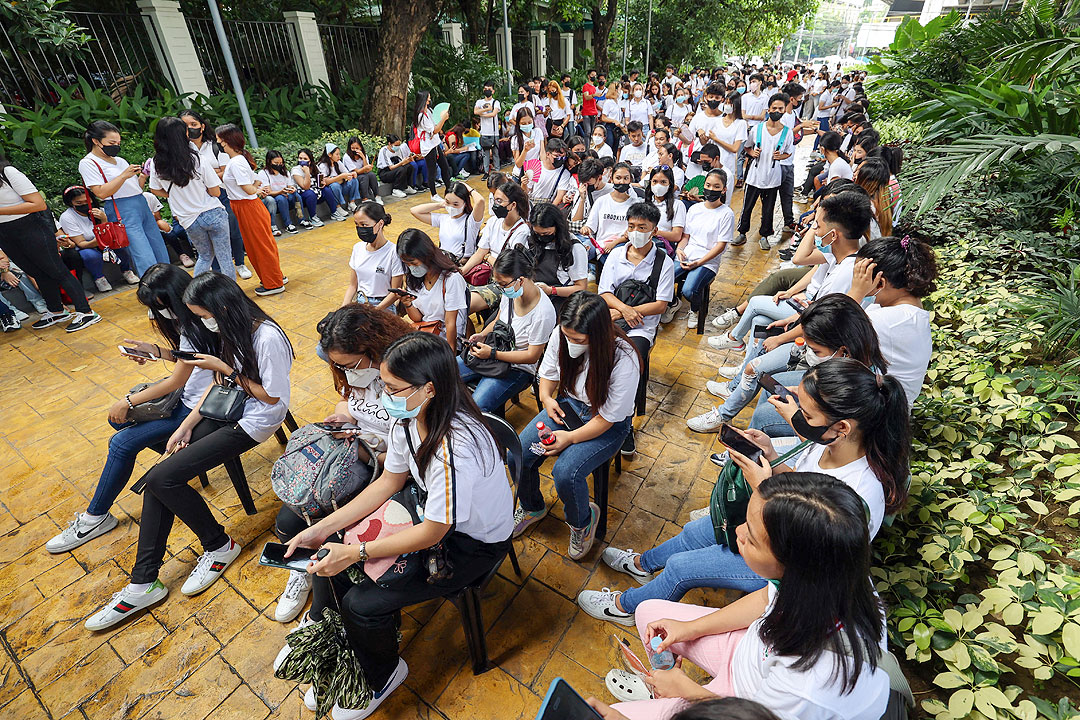Locked-down Filipino college graduates face gloomy COVID-19 labor market

By Arjay L. Balinbin, Senior Reporter
JEROEN O. MANAHAN, 21, will get his Bachelor’s degree in business administration and management this October after taking classes online amid the coronavirus pandemic.
After graduation, he will fly to Dubai to join his family as an overseas Filipino worker, hoping to find a job that pays at least P50,000 a month.
“There will be better opportunities for me in Dubai than in the Philippines,” the student from Southville International School and Colleges said by telephone. “The starting salary for fresh graduates here isn’t competitive.”
 That’s especially true after a number of companies trimmed their workforce to save costs after pandemic lockdowns in the past two years slashed sales and profits.
That’s especially true after a number of companies trimmed their workforce to save costs after pandemic lockdowns in the past two years slashed sales and profits.
This year, more than 1.6 million students will graduate from 200 state-run higher education institutions nationwide, according to government media, further worsening the country’s job situation.
Fresh graduates in the Philippines get a monthly average salary of P16,509, based on 1,200 salaries reported as of May 19, according to job website Indeed.
For highly skilled new graduates, the monthly pay is P20,000 to P25,000, Trade Union Congress of the Philippines (TUCP) spokesman Alan A. Tanjusay said.
“When disorientation occurs as a result of a mismatch between graduates’ salary expectations and the actual salary, they choose to work abroad,” he said in a phone interview.
Starting June 3, Metro Manila workers will get a P33 wage hike and those in Western Visayas will get a P55-P100 increase, according to the Labor department. Separate wage increases were also approved for the Ilocos, Cagayan Valley, and Caraga regions.
Almost four million more Filipinos became poor in the first half of last year amid the coronavirus pandemic, bringing the total to 26.14 million, the Philippine Statistics Authority said. The country’s per capita poverty threshold — the amount needed by a person to buy basic goods such as food — rose to P2,416.33 a month from P1,474.83 in 2018, according to the local statistics agency.
The unemployment rate eased to 5.7% in April from 5.8% in March and 8.7% a year earlier, with 2.76 million jobless Filipinos.
But about 6.4 million employed Filipinos were still looking for extra jobs or longer work hours, or an underemployment rate of 14%.
“It looks like we’re promoting cheap labor,” Mr. Tanjusay said. “The government hasn’t said so, but the way it does things now, especially with wages, it promotes our country as a cheap labor hub. Investments will come in and guarantee profits to existing businesses and incoming investors because the Philippines is also competing with its neighbors in Southeast Asia.”
Troy A. Manuel, 22, will finish his BS Mathematics degree at the University of the Philippines (UP) this month, and would rather look for local jobs. His father is coming home after working in Saudi Arabia for more than two decades.
“I’m not expecting that much because I don’t have any experience — maybe P20,000 to P30,000 a month,” he said by telephone. “But I’m not very optimistic.”
A number of workers who lost their jobs at the height of the pandemic have yet to be called back to work, said Sergio R. Ortiz-Luis, Jr., president of the Employers Confederation of the Philippines.
‘VOLATILE’
“Fresh graduates will have to compete with returning workers, including migrant workers who are coming home,” he said by telephone. “Competition will be harder.”
Fresh graduates do have an advantage because they might be more tech-savvy, he added.
The government partnered with the employers’ group to generate a million jobs last year, and they expect to offer a million more this year, Mr. Ortiz-Luis said. The jobs will come from the manufacturing, construction, and outsourcing sectors, he added.
“There is a need to create jobs for those who are still unemployed because there are still so many of them, as well as for those who will be coming into the labor market,” he added.
The incoming government of President-elect Ferdinand R. Marcos, Jr. “must create four million jobs in two years or else poverty will worsen,” Mr. Tanjusay said, citing recent labor force surveys.
Ethan J. Parreño, a 22-year-old AB Management Economics student who is graduating from the Ateneo de Manila University in August, is worried about his job prospects.
“Apart from the competition, half of my college education was done online including my on-the-job training due to the pandemic,” he said by telephone. “I’m worried that I might not be able to adjust as quickly to on-site work.”
He hopes to get a job that pays P20,000 to P30,000 a month. “But my dad tells me that I shouldn’t expect to get a big salary on my first job.”
Mr. Tanjusay said it’s not wrong for new graduates to expect a high salary. “Graduates, especially those from private universities, were exposed to good facilities, and they paid high tuition fees, so they would really have high expectations. However, in our existing economy, the reality is that the starting salary is really small.”
“Very few businesses and employers are innovative, adoptive and receptive to the needs of new graduates,” he added.
The Philippine job market is expected to remain gloomy, UP Professor Emeritus Rene E. Ofreneo said.
“The employment rate isn’t yet at the pre-pandemic level, but even before the pandemic, the situation wasn’t good,” he said by telephone.
“Even the overseas market isn’t that bright for workers in general,” he said. “Many Filipinos want to work abroad, but remember that the world in general is very uncertain and volatile. The pandemic has disrupted the so-called global economic order, in particular those tied to the global value chain, and that’s why even China is in crisis.”
The coronavirus pandemic also disrupted the Fourth Industrial Revolution, Mr. Ofroneo said. “Some jobs disappeared, while some new jobs were created. You also have the Ukraine-Russia war, Russia versus the US, and Russia versus the North Atlantic Treaty Organization, resulting in oil and fertilizer crises, as well as a looming food crisis.”
The labor situation is a big challenge for the Marcos government, he said.
Mr. Marcos in January vowed to generate more jobs during the pandemic. “We have to put Filipinos back to work, and the way we do it is to invest in sectors with a good return.”
Mr. Ofreneo and Mr. Tanjusay said Mr. Marcos’ labor policy remains unclear.
“He’s focusing too much on continuity,” Mr. Ofreneo said. “If the focus is continuity, then it’s just like business as usual.”
“He should initiate something bold that will capture the support of the majority. If his message is ‘We will rise,’ then how? What we need is productive capital that can create productive jobs now,” he added.
“The policies of the Marcos administration aren’t clear to us, although the TUCP endorsed Mr. Marcos because our members chose him,” Mr. Tanjusay said.
Victor D. Rodriguez, who will be Mr. Marcos’ executive secretary, did not immediately reply to two mobile phone messages seeking comment.
Mr. Manahan, the management student, hopes for a time when he and his family will no longer have to live and work overseas. “Given the chance, I really want to work in my homeland.”



